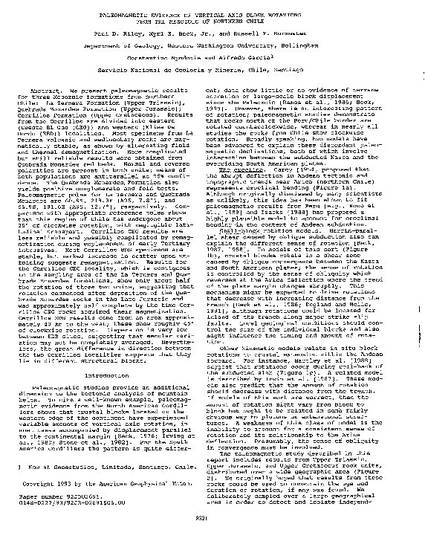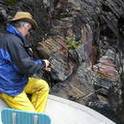
We present paleomagnetic results for three Mesozoic formations from northern Chile: La Ternera Formation (Upper Triassic), Quebrada Monardes Formation (Upper Jurassic); Cerrillos Formation (Upper Cretaceous). Results from the Cerrillos are divided into eastern (Cuesta El Gao (CEG)) and western (Elisa De Bordo (EBD)) localities. Most specimens from La Ternera volcanic and sedimentary rocks are magnetically stable, as shown by alternating field and thermal demagnetization. More complicated but still reliable results were obtained from Quebrada Monardes red beds. Normal and reverse polarities are present in both units; means of both populations are antiparallel at 95% confidence. The Quebrada Monardes Formation also yields positive conglomerate and fold tests. Paleomagnetic poles for La Ternera and Quebrada- Monardes are 60.9S, 218.3E (A95, 7.8°), and 66.9S, 191.6E (A95, 12.7°), respectively. Comparison with appropriate reference poles shows that this region of Chile has undergone about 25° of clockwise rotation, with negligible latitudinal transport. Cerrillos CEG results are less reliable and possibly complicated by remag- netization during emplacement of early Tertiary intrusives. Most Cerrillos EDB specimens are stable, but marked increase in scatter upon unfolding suggests remagnetization. Results for the Cerrillos CEG locality, which is contiguous to the sampling area of the La Ternera and Quebrada Monardes formations, show only about half the rotation of those two units, suggesting that rotation commenced after deposition of the Quebrada Monardes rocks in the Late Jurassic and was approximately half complete by the time Cerrillos CEG rocks acquired their magnetization. Cerrillos EDB results come from an area approximately 40 km to the west; these show roughly 45° of clockwise rotation. Dispersion is very low between EDB sites, suggesting that secular variation may not be completely averaged. Nevertheless, the great difference in direct:ion between the two Cerrillos localities suggests that they lie in different structural blocks.
Available at: http://works.bepress.com/russ_burmester/12/
